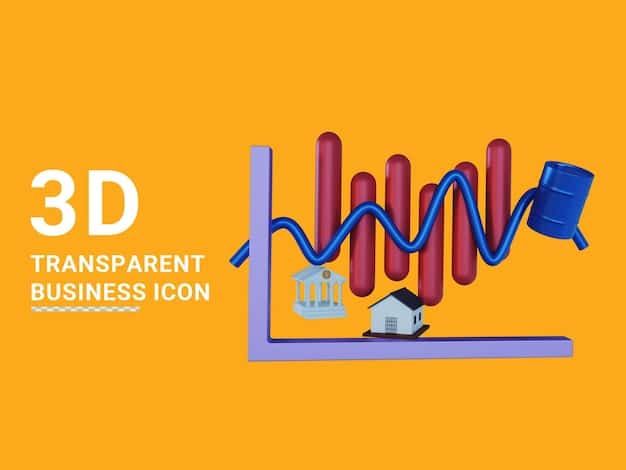Financial Planning: Debt Management Strategies for Retirement

Financial planning for debt management involves strategically paying off high-interest debt before retirement through budgeting, debt consolidation, and smart investment choices to secure long-term financial stability.
Planning for retirement while managing debt, especially high-interest debt, can feel like navigating a maze. However, with a clear strategy and disciplined approach to financial planning for debt management, achieving a debt-free retirement is within reach. Let’s explore effective strategies to manage and eliminate high-interest debt before you retire.
Understanding the Importance of Financial Planning for Debt Management
Financial planning for debt management isn’t just about paying bills; it’s about securing your financial future. High-interest debt can significantly impede your ability to save for retirement and enjoy your golden years. Understanding the importance of addressing debt now is the first step toward a more secure retirement.
Taking control of your financial situation and managing debt effectively involves several key steps. Let’s look at how to address the financial situation head on.
Assessing Your Current Debt Situation
The initial step in conquering debt involves a comprehensive assessment of your accounts and debts. This provides a clear picture of what you owe and helps prioritize what you need to tackle first.
- List All Debts: Create a detailed list that includes every debt you have, from credit cards and personal loans to mortgages and student loans.
- Identify Interest Rates: Note the interest rate for each debt. Prioritize debts with the highest interest rates, as these are costing you the most money over time.
- Calculate Total Debt: Sum up all your debts to understand the total amount you owe. This gives you a clear perspective on the scope of your debt situation.
Budgeting for Debt Repayment
Budgeting is critical for debt repayment. Creating a realistic budget enables you to allocate funds specifically for reducing your debt.
A well-structured budget can help you identify areas where you can save money and redirect those savings toward debt repayment. This ensures you have a sustainable plan and the means to consistently pay down your debt.

Strategies for Tackling High-Interest Debt
Once you have a clear understanding of your debt situation and have established a budget, you can explore different strategies for handling high-interest debt. Some of the best strategies include, but are not limited to, the debt avalanche and consolidation.
The right approach will depend on your financial situation and personal preferences. Exploring these strategies will allow you to determine what makes the most sense for your individual situation.
The Debt Avalanche Method
The debt avalanche method involves prioritizing debt repayment based on interest rates. This approach saves you money in the long run because you’re tackling the most expensive debts first.
By focusing on high-interest debts, the avalanche method minimizes the total interest paid over time, leading to quicker debt elimination and long-term financial savings.
Debt Consolidation
Debt consolidation means combining multiple debts into a single, more manageable loan. This can simplify repayment and potentially lower your interest rate.
- Personal Loans: Use a personal loan with a lower interest rate to pay off higher-interest debts.
- Balance Transfer Credit Cards: Transfer balances from high-interest credit cards to a card with a 0% introductory APR.
- Home Equity Loans: Utilize the equity in your home to consolidate debts, but be cautious as your home becomes collateral.
Investing and Debt Repayment: Balancing Act
Deciding whether to invest or pay down debt can be complex, especially when planning for retirement. The right approach depends on individual circumstances, including age, risk tolerance, and debt interest rates.
Striking the right balance between investing and debt repayment is crucial for long-term financial health. This is a balancing act and should be approached with thoughtful planning and consideration.
When to Prioritize Investing
Investing, especially in tax-advantaged retirement accounts, can offer significant long-term benefits.
Investing can lead to substantial growth over time, especially through strategies like dollar-cost averaging, and can help you amass a larger retirement fund.
When to Focus on Debt Repayment
High-interest debt can erode your overall financial health, making aggressive repayment a smarter choice. Paying off high-interest debts eliminates financial drag and provides immediate savings.

Long-Term Financial Planning Considerations
Effective financial planning for debt management extends beyond immediate strategies; it involves long-term considerations that affect your overall financial health and retirement readiness. These are the areas that provide focus on long-term and sustainable growth.
Creating a long-term strategy that addresses both debt repayment and retirement savings ensures a secure and comfortable financial future.
Retirement Savings Strategies
Optimizing retirement savings is critical, especially when managing debt. This ensures you’re prepared for retirement while tackling current financial obligations.
- Maximize Employer Matching Contributions: Take full advantage of any employer matching contributions to boost your retirement savings.
- Consider Roth vs. Traditional Accounts: Evaluate the tax advantages of Roth and traditional retirement accounts based on your income and tax situation.
- Regularly Review and Adjust: Periodically review your retirement savings strategy to ensure it aligns with your long-term goals.
Emergency Savings
Building an emergency fund provides a financial cushion to handle unexpected expenses without incurring more debt. This is a key part of an overall good plan.
Having an emergency fund ensures you can cover unexpected costs without relying on credit cards or loans, maintaining progress on your debt repayment goals.
Maintaining Financial Discipline and Seeking Professional Help
Staying financially disciplined is key for successfully managing debt and achieving long-term financial goals. Creating good habits early on will help ensure you achieve debt-free status when entering retirement.
Combining self-discipline with expert advice can maximize your efforts and pave the way for a secure retirement.
Building Good Financial Habits
Developing sound financial habits can make a significant difference in staying on track with your debt repayment and savings goals. Good financial habits pave the path for success.
These habits not only help in managing debt but also in building a solid financial foundation for the future.
When to Consult a Financial Advisor
Seeking advice from a financial advisor can provide personalized strategies and support for financial planning for debt management. An expert can provide a detailed view of your finances.
A financial advisor can offer customized solutions, help you navigate complex financial decisions, and create a tailored plan to achieve your retirement goals.
By prioritizing debt management and implementing effective strategies, you can pave the way for a financially secure and enjoyable retirement. Effective planning provides peace of mind and a better financial outlook.
| Key Point | Brief Description |
|---|---|
| 📊 Debt Assessment | Analyze and list all your debts, noting interest rates for prioritization. |
| 💰 Debt Avalanche | Pay off debts with highest interest rates first to save money. |
| 🏦 Debt Consolidation | Combine multiple debts into one loan with a lower interest rate. |
| 🛡️ Emergency Fund | Create a financial cushion to avoid incurring more debt with unexpected expenses. |
Frequently Asked Questions
Financial planning for debt management is the process of creating a strategy to reduce and eliminate debt, while also focusing on long-term financial goals like retirement savings. It involves budgeting, prioritizing debts, and making informed financial decisions.
The debt avalanche method involves listing all your debts and prioritizing them based on interest rates. You focus on paying off the debt with the highest interest rate first while making minimum payments on the others. This method minimizes total interest paid.
Debt consolidation simplifies your finances by combining multiple debts into one, often with a lower interest rate. This can result in lower monthly payments and easier management. It can also potentially shorten the repayment timeline.
It depends on your situation. If you have high-interest debt, prioritize paying it off. If your debt interest rates are low, consider investing while making minimum debt payments. Consult a financial advisor for personalized advice.
A financial advisor can assess your financial situation, create a personalized debt management plan, offer guidance on budgeting and investing, and help you make informed decisions to achieve your financial goals and secure your retirement.
Conclusion
Effective financial planning for debt management is a cornerstone of securing a comfortable retirement. By understanding your debt, implementing strategic repayment methods, and maintaining financial discipline, you can successfully navigate your financial journey and achieve a debt-free retirement. Consider seeking professional advice to tailor a plan that aligns with your specific needs and goals.





